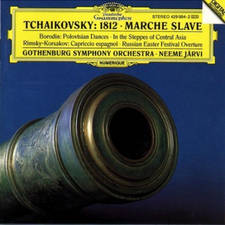Mozart Horn Concertos
Have you heard the one about the cheesemonger and the horn player? Well, they’re actually the same person, and both he and Mozart were great friends; so much so that the Austrian composer wrote his horn concertos for the brass-blowing cheesemonger.
Joseph Leutgeb is the man in question and he played first horn in the Salzburg court orchestra before settling in Vienna in 1777 where he ran a cheesemonger’s shop. Between 1783 and 1787, Mozart completed three horn concertos. He began composing a fourth concerto, K412, during the last summer of his life but only succeeded in finishing the first movement and part of the finale by the time of his death in 1791. It was left to one of Mozart’s pupils, Franz Xaver Süssmayr, to complete the last movement.
All four concertos were composed for the natural horn, as the modern valved horn hadn’t yet been developed. The notes are achieved in a number of different ways, including placing the hand in the bell of the horn in order to alter the pitch and the timbre. Two of our contenders feature the natural horn; firstly Anthony Halstead, who manages to produce a variety of colourful sounds – a good example being in K417 in which the different nuances he obtains combine well with his agile playing. However, the overly reverberant acoustic is distracting. This is a trait that happily doesn’t hamper Paul van Zelm’s opulent natural horn version. Not only is his playing sprightly, as it is in the third movement of K417, but his interpretative freedom and lyrical tone make it hard at times to distinguish it from a modern horn. The orchestral accompaniment throughout deserves special praise, as it greatly adds to the overall enjoyment.
As for the modern day horn, we firstly turn to a recording of yesteryear – 1953 to be precise – with Dennis Brain as the soloist. This is a flawless and spirited account, where even the inferior mono sound is nullified by Brain’s supreme artistry. The final two movements of K495 aptly demonstrate both his incomparable technique and more reflective side. The same can be said of Barry Tuckwell’s seemingly effortless take on this concerto. Overall, Tuckwell conveys the wit and playfulness of aspects of these works and, like Halstead’s recording, a harpsichord is included.
For an arguably smoother finish, David Pyatt more than fits the bill. The former Young Musician of the Year displays all the necessary attributes, including a ravishing sound, but it’s perhaps a little cool on personality.
So is it to be ‘au naturel’ or the refinements of the modern instrument? Well, because of its inherent beauty the recording that overwhelmingly transcends all others is Dennis Brain’s 50-year-plus interpretation.
THE RECORDING TO OWN
Dennis Brain (hn), Philharmonia Orchestra/Herbert von Karajan Two words sum up this evergreen recording – self recommending. It may be old, but it’s hard to see it ever being surpassed. Dare we say, a no-brainer?!
EMI Classics 965 9362
ALSO CONSIDER…
■ Barry Tuckwell (hn), ASMF/Neville Marriner If a stereo version is a must then this one is highly recommended.
EMI Classics 574 9672
■ Anthony Halstead (nat horn), Hanover Band/Roy Goodman Skilfully played by Halstead though some may find the acoustic distracting. Nimbus NI 5104
■ David Pyatt (hn), ASMF/Neville Marriner Sublime playing from a great soloist and fine orchestra.
Warner 2564 69719-9
■ Paul van Zelm (nat horn), Combattimento Consort Amsterdam/de Vriend Performances of great authority and elegance.
Etcetera KTC 5253
























